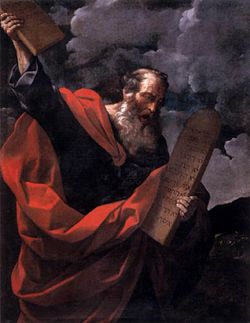Moses
Moses is a prophet in the Old Testament, chosen by God to lead the Israelites out of slavery in Egypt and to receive the Law on Mount Sinai. He is seen as a mediator of God's covenant with Israel, through whom God revealed His moral and ceremonial laws, pointing to humanity's need for redemption. Moses' life exemplifies God's sovereign election and grace, as he was divinely appointed despite his own weaknesses and doubts. Moses was not on a great prophet and leader but also as saviour, foreshadowing the ultimate deliverance that would come through Jesus, who fulfils the Law and brings God's people into the true promised land of eternal life.

Moses is a pivotal figure in both the religious and historical narrative of God's redemptive work. Born into a Hebrew family during a time of intense persecution in Egypt, Moses was miraculously saved from Pharaoh's decree to kill all Hebrew male infants, growing up instead in the Egyptian royal household. His early life in Pharaoh's court uniquely positioned him for the leadership role he would later assume. Around the 13th or 14th century BCE, after fleeing Egypt due to a conflict with an Egyptian overseer, Moses encountered God in the burning bush on Mount Horeb, where he was divinely commissioned to lead the Israelites out of slavery. His role in the Exodus is seen as a defining moment in Israel's history, symbolizing God's deliverance and foreshadowing the ultimate deliverance through Christ. The giving of the Law at Mount Sinai under Moses' leadership established the foundation of Israel's identity and their covenant relationship with God, while the wandering in the wilderness highlighted both the people's sinfulness and God's enduring faithfulness. Moses' death on Mount Nebo, just outside the Promised Land, marks the end of an era and the transition to Joshua's leadership, but his legacy endures as a prophet who prefigured Christ and as a key figure in God's unfolding plan of salvation.
He is considered a prophet in some other religions, such as Islam and modern Judaism.